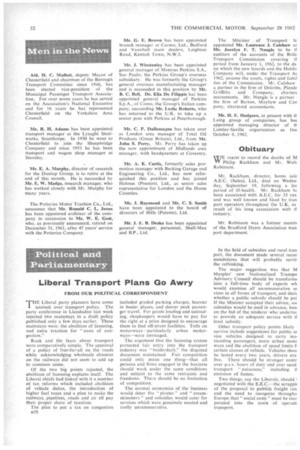Liberal Transport Plans Go Awry
Page 54

If you've noticed an error in this article please click here to report it so we can fix it.
FROM OUR POLITICAL CORRESPONDENT
'THE Liberal party planners have come 1 unstuck over transport policy. The party conference in Llandudno last week rejected two mainstays in a draft policy published only a few days earlier. These mainstays were: the abolition of licensing, and extra taxation for "Costs of congestion."
Rank and file fears about transport were comparatively simple. The approval of a policy of free-for-all on the roads while acknowledging wholesale closures on the railways did not seem to add up to common sense.
Of the two big points rejected, the abolition of licensing explains itself. The Liberal chiefs had linked with it a number of tax reforms which included abolition of vehicle duties, the introduction of higher fuel taxes and a plan to make the railways, pipelines, roads and air all pay their proper share of taxation.
The plan to put a tax on congestion B28 included graded parking charges, heavier in busier places, and dearer peak passenger travel. For goods loading and unloading, shopkeepers would have to pay for the right at a price designed to encourage them to find off-street facilities. Tolls on motorways—particularly urban motorways—were envisaged.
The argument that the licensing system protected fair entry into the transport industry was balderdash," the disputed document maintained. Fair competition could only mean one thing—that all persons and firms engaged in the business should work under the same conditions and subject to the same restraints and freedoms. There should be no limitation of competition.
The normal economics of the business would deter the " pirates " and " creamskimmers " and subsidies would cater for services which were genuinely needed and really unremunerative. In the field of subsidies and rural tran port, the document made several recon mendations that will probably survil the rethinking.
The major suggestion was that M Marples' new Nationalized Transpo Advisory Council should be transforrnt into a full-time body of experts wh would examine all unremunerative se vices in all forms of transport, and deck whether a public subsidy should be pai If the Minister accepted their advice, sut subsidies would be paid in advance, bast on the bid of the tenderer who undertoc to provide an adequate service with ti least subsidy.
Other transport policy points likely • survive include suggestions for public se vice vehicles designed to carry mo standing passengers, more urban moto ways and the abolition of speed limits fi certain classes of vehicle. Vehicles shou be tested every two years, drivers eve. five. There should be .stronger contr over p.s.v. hours of duty and over sund. transport "nuisances," including. ti emission of fumes.
Two things, say the Liberals, should 1 negotiated with the E.E.C.—the scrappii of the proposal to publish freight rah and the need to recognize througho Europe that "social costs" must be incc porated into the costs of operatii transport.






































































































































































